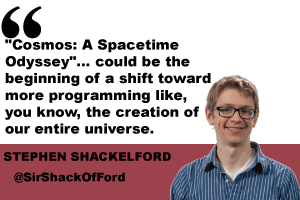 "Cosmos: A Spacetime Odyssey" premiered March 9 to 8.5 million viewers across 10 networks, according to deadline.com. The show is phenomenal, and it could be the beginning of an important and desperately needed shift in the world of television programming — one that trends away from topics like Justin Bieber and toward deeper, more intellectually challenging topics such as, you know, the creation of our entire universe. However, people have come out and denied a lot of basic science included in the show.
"Cosmos: A Spacetime Odyssey" premiered March 9 to 8.5 million viewers across 10 networks, according to deadline.com. The show is phenomenal, and it could be the beginning of an important and desperately needed shift in the world of television programming — one that trends away from topics like Justin Bieber and toward deeper, more intellectually challenging topics such as, you know, the creation of our entire universe. However, people have come out and denied a lot of basic science included in the show.
If you haven’t watched yet, then you should. It's a good challenge to the science-deprived media that we are bathed in every day.
"Cosmos: A Spacetime Odyssey" is a remake of the 1980 hit television series originally hosted by Carl Sagan. That series is still beloved today and is renowned for bringing incredibly complex scientific topics to audiences in a highly entertaining and understandable way.
The modern-day equivalent, hosted by astrophysics rock star Neil deGrasse Tyson, delivers the same poetic, inspiring and wonder-inducing presentation as the original, now with the added benefit of today’s powerhouse CGI. People still take issue with Tyson's scientific prowess and try to take it down. This is probably because these naysayers are so set in their ways from the constant mediation of their anti-science beliefs.
In the first episode alone Tyson’s dulcet tones guided us from the very beginning of our universe — following the widely accepted Big Bang theory — to the present, breaking down the entirety of our universe’s 13.8 billion year history into a 12-month Cosmic Calendar. How much space does the entirety of human existence occupy on that calendar? Only the last 14 seconds of December. That’s it.
We are but a blip on the radar. Some find this to be extremely offensive to their beliefs and seek to shed light on the theoretical nature of this show. It's abhorrent that some people would question the scientific theory supported by many scientists today. The reasoning for this is that these theories are not scientific. Tyson denies that his show is anti-religion and escapes the trap of arguing about the very validity of the debate.
"Cosmos" perfectly portrays the wonder, beauty and infinite complexity of our universe — and our relatively minor place within it. It even makes brief mention of global warming and evolution, two important topics that have been made politically controversial but aren’t actually that controversial in the scientific community.
These are the topics that need to be brought to the attention of the average person. These are topics that really matter. Thankfully, we already have 13 episodes of "Cosmos" in the pipeline, but the success of this first season could open the door to even more — and better — educational shows and documentaries.
So, I have a proposition for you:
If you love deep thinking, intellectual challenges and science; if you are naturally curious, and are unafraid to look your own insignificance in the eye, then please tune in to "Cosmos" every Sunday at 9 p.m. Show the people at Fox that their latest endeavor means something, and that you would like to see more. By simply tuning in, you are raising your voice for a better and more informative television culture.
Reach the columnist at svshacke@asu.edu or follow him on Twitter @sirshackofford




